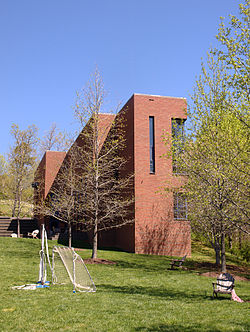Hereford College
 |
|
| Type | Residential college |
|---|---|
| Established | 1992 |
| Principal | Wendy Cohn |
|
Academic staff
|
SR: Vignesh Kuppusamy |
| Students | 204 |
| Undergraduates | 200 |
| Postgraduates | 4 |
| Location |
Charlottesville, Va., USA 38°1′48.2″N 78°31′10.6″W / 38.030056°N 78.519611°WCoordinates: 38°1′48.2″N 78°31′10.6″W / 38.030056°N 78.519611°W |
| Campus | 2 residence halls, 1 principal's house |
| Leadership | Hereford Student Senate |
| Colors | Blue and Green |
| Affiliations | University of Virginia |
| Website | Hereford.virginia.edu |
Hereford College is a self-governed residential college at the University of Virginia that originally housed 500 students, mostly in single-occupancy rooms. Its stated core values are environmental sustainability, cultural diversity, and community outreach. Originally comprising 5 dorms within one area complex, the residential college has since been reduced to 2 dorms. Thus, only about 200 students reside as part of Hereford College; the rest are designated as normal undergraduate on-grounds students.
Named after physicist Frank Hereford, who was President of the University between 1974 and 1985, the college opened in 1992 as New College, UVA's second residential college. It consists of five strikingly thin dorm buildings, a principal's building, and its own residential cafeteria. Hereford was designed by Tod Williams Billie Tsien Architects, which also designed the American Folk Art Museum in New York, the Neurosciences Institute in San Diego, and the Student Art Building of Johns Hopkins University.
The college is unique among UVA housing in that most of the rooms are single occupancy, meaning that most Herefordians do not share a room with a roommate or suitemate. This may afford more privacy than other housing on Grounds. However, first years still typically share a room, which given Hereford's unique structure, can lead to lifelong connections and unions.
As Hereford is located behind the Dillard House complex and basically hidden from the rest of Grounds, it can feel quite remote. In actuality it is less than ½ of a mile from Scott Stadium and the first-year "New Dorms" along Alderman Road, and within 1 mile of virtually every undergraduate class taught at the University.
...
Wikipedia
